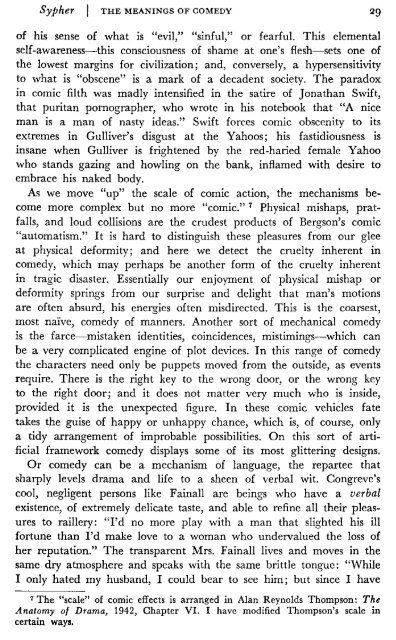The Meanings of Comedy* - Shakespeare Navigators
The Meanings of Comedy* - Shakespeare Navigators
The Meanings of Comedy* - Shakespeare Navigators
Create successful ePaper yourself
Turn your PDF publications into a flip-book with our unique Google optimized e-Paper software.
Sypher I rrrr MEANTNGs oF coMEDY 29<br />
<strong>of</strong> his sense <strong>of</strong> what is "evil," "sinful," or fearful. This elemental<br />
self-awareness-this consciousness <strong>of</strong> shame at one's flesh-sets one <strong>of</strong><br />
the lowest margins for civilizationl and, conversely, a hypenensitivity<br />
to what is "obscene" is a mark <strong>of</strong> a decadent society. <strong>The</strong> paradox<br />
in comic filth was madly intensified in the satire <strong>of</strong> Jonathan Swift,<br />
that puritan pornographer, who wrote in his notebook that "A nice<br />
man is a man <strong>of</strong> nasty ideas." Swift forces comic obscenity to its<br />
extremes in Gulliver's disgust at the Yahoos; his fastidiousness is<br />
insane when Gulliver is frightened by the red-haried female Yahoo<br />
who stands gazing and howling on the bank, inflamed with desire to<br />
embrace his naked body.<br />
As we move "up" the scale <strong>of</strong> comic action, the mechanisms become<br />
more complex but no more "comic." Physical mishaps, pratfalls,<br />
and loud collisions are the crudest products <strong>of</strong> Bergson's comic<br />
"automatism." It is hard to distinguish these pleasures from our glee<br />
at physical deformity; and here we detect the cruelty inherent in<br />
comedy, which may perhaps be another form <strong>of</strong> the cruelty inherent<br />
in tragic disaster. Essentially our enjoyment <strong>of</strong> physical mishap or<br />
deformity springs from our surprise and delight that man's motions<br />
are <strong>of</strong>ten absurd, his energies <strong>of</strong>ten misdirected. This is the coarsest,<br />
most naive, comedy <strong>of</strong> manners. Another sort <strong>of</strong> mechanical comedy<br />
is the farce-mistaken identities, coincidences, mistimings-which can<br />
be a very complicated engine <strong>of</strong> plot devices. In this range <strong>of</strong> comedy<br />
the characters need only be puppets moved from the outside, as events<br />
require. <strong>The</strong>re is the right key to the wrong door, or the wrong key<br />
to the right door; and it does not matter very much who is inside,<br />
provided it is the unexpected figure. In these comic vehicles fate<br />
takes the guise <strong>of</strong> huppy or unhappy chance, which is, <strong>of</strong> course, only<br />
a tidy arrangement <strong>of</strong> improbable possibilities. On this sort <strong>of</strong> artificial<br />
framework comedy displays some <strong>of</strong> its most glittering designs.<br />
Or comedy can be a mechanism <strong>of</strong> language, the repartee that<br />
sharply levels drama and life to a sheen <strong>of</strong> verbal wit. Congreve's<br />
cool, negligent persons like Fainall are beings who have a uerbal<br />
existence, <strong>of</strong> extremely delicate taste, and able to refine all their pleasures<br />
to raillery: "I'd no more play with a man that slighted his ill<br />
fortune than I'd make love to a woman who undervalued the loss <strong>of</strong><br />
her reputation." <strong>The</strong> transparent Mrs. Fainall lives and moves in the<br />
same dry atmosphere and speaks with the same brittle tongue: "While<br />
I only hated my husband, I could bear to see him; but since I have<br />
<strong>The</strong> "scale" <strong>of</strong> comic effects is arranged in Alan Reynolds Thompson: Tfta<br />
Anatomy <strong>of</strong> Drama, 1942, Chapter VI. I have modified Thompson's scale in<br />
certain ways.


